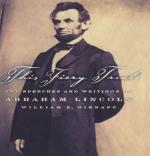
|
| Name: _________________________ | Period: ___________________ |
This test consists of 15 multiple choice questions and 5 short answer questions.
Multiple Choice Questions
1. What did Lincoln urge Congress NOT to do in "The Tug Has to Come"?
(a) Give the south an extension on their taxes.
(b) Give the south any extension of slavery.
(c) Give the south financial support.
(d) Give the south the chance to gather forces.
2. What did Lincoln stress in "The Union is Perpetual"?
(a) That the north was free of sin.
(b) That the north had remained silent long enough.
(c) That the Union must stay together.
(d) That the north would not pay for the crimes of the south.
3. What battle was "Constantly Drilled, Disciplined, and Instructed" a response for?
(a) Battle of Rich Mountain.
(b) Battle of Dry Wood Creek.
(c) Battle of Bull Run.
(d) Battle of Wilson's Creek.
4. Who made the charge Lincoln answered to in "I am Not a Member of Any Church" ?
(a) A political opponent.
(b) The Supreme Court.
(c) One of his constituents.
(d) A prominent Preacher.
5. Who was "For a Vast Future Also" intended for?
(a) The Confederacy.
(b) Generals.
(c) Mayors.
(d) Congress.
6. What was Lincoln little patience with according to "Grumbling Despatches and Letters"?
(a) Squabbling prisoners of the Confederacy.
(b) Squabbling politicians.
(c) Squabbling generals.
(d) Squabbling mayors.
7. At what age did Lincoln stop working on the family farm?
(a) 23.
(b) 21.
(c) 18.
(d) 15.
8. Who did Lincoln face in the senatorial election according to "A House Divided"?
(a) Charles Pinckney.
(b) Arthur Hayne.
(c) John Hunter.
(d) Stephen Douglas.
9. What is the topic of "More Painful Than Pleasant"?
(a) The imminent death of Lincoln's sister.
(b) The imminent death of Lincoln's brother in law.
(c) The imminent death of Lincoln's mother.
(d) The imminent death of Lincoln's father.
10. When was Lincoln elected in the state legislature according to "I Shall Be Governed By Their Will"?
(a) 1837.
(b) 1834.
(c) 1836.
(d) 1835.
11. Who was "More Painful Than Pleasant" intended for?
(a) Lincoln's sister.
(b) Lincoln's step-brother.
(c) Lincoln's father.
(d) Lincoln's mother.
12. What does Grace Bedell suggest Lincoln should do in the letter Lincoln answer to with "A Piece of Silly Affection" ?
(a) Eat more food.
(b) Grow a beard.
(c) Meet her mother.
(d) Marry her.
13. When was "A Moral, a Social, and a Political Wrong" written?
(a) 1857.
(b) 1860.
(c) 1856.
(d) 1858.
14. What is the most important characteristic of the ideal lawyer according to "Resolve to Be Honest"?
(a) Rhetoric skills.
(b) Diligence.
(c) Timeliness.
(d) Courage.
15. What did the Whigs support according to "Bow to It I Never Will"?
(a) Emancipation.
(b) A strong national bank.
(c) Trade with England.
(d) Small banks.
Short Answer Questions
1. How does Lincoln portray himself in "For, and Not Against the Union"?
2. When was "A House Divided" written?
3. When was the Dred Scott case judged by the Supreme Court according to "All the Powers of Earth Seem Rapidly Combining Against Him"?
4. Who was "An Affectionate Farewell" intended for?
5. When was the Kansas-Nebraska act signed according to "Our Republican Robe is Soiled"?
|
This section contains 448 words (approx. 2 pages at 300 words per page) |

|




